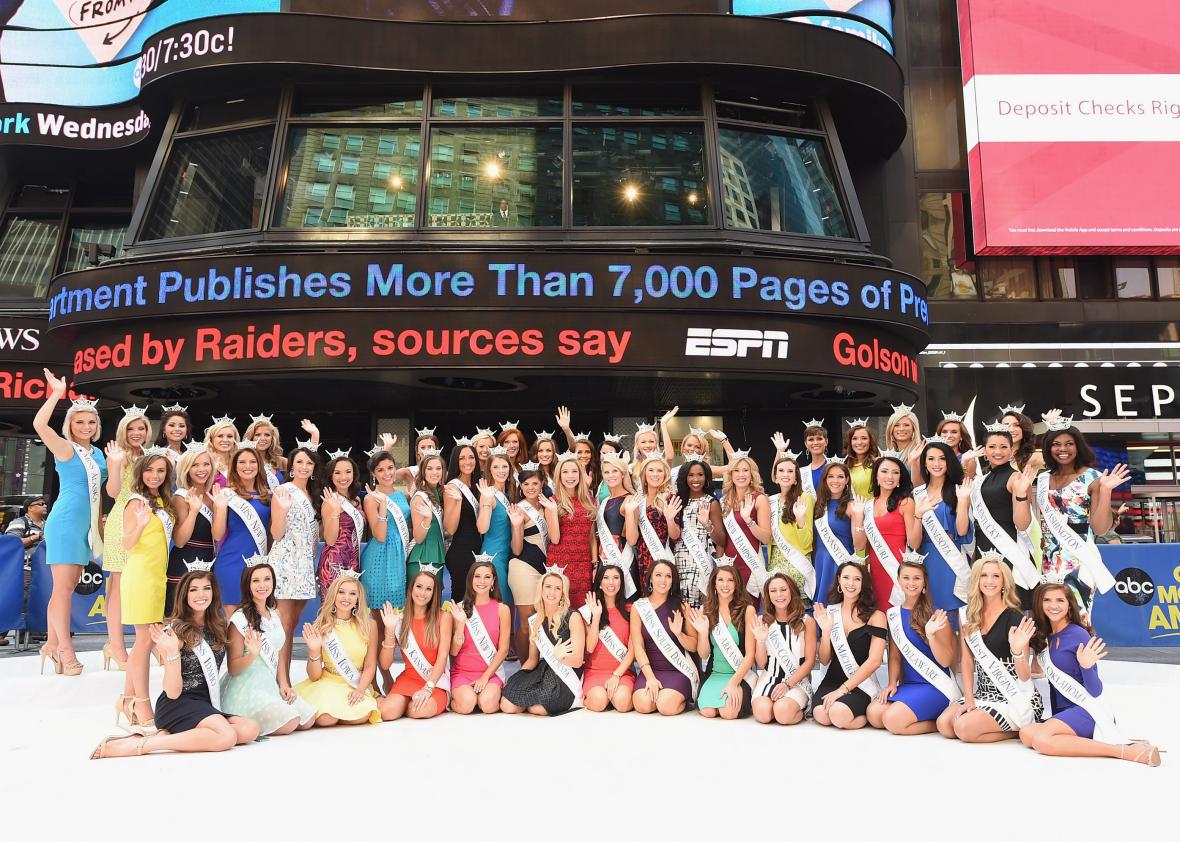This September’s Miss America competition will mark an important milestone for the 95-year-old institution: Erin O’Flaherty, who was crowned Miss Missouri on Saturday, will be the first openly gay contestant to compete for the crown.
O’Flaherty, 23, told St. Louis alt-weekly the Riverfront Times that she hopes to “open up people’s eyes and minds a little bit” with her public platform. She’s well aware that her win might bring escalated harassment—she said she had “concerns” about coming out in public when she was 18 because “progressive is not exactly a word people might think of when you think Missouri.”
It’s not exactly a word people might think of when they think of America, either. This country is full of unabashed homophobes who boycott Target over bathrooms and claim that gays are trying to harm their home states by getting married. Now that O’Flaherty is moving on to the national competition, they’ll soon get word of her success. By pursuing her goal of becoming Miss America truthfully and openly, without letting the potential for backlash dissuade her, she’s setting an admirable example for young people of all sexualities.
O’Flaherty’s win is yet another reminder of the dizzying political progress LGBTQ advocates have made in the past decade. Who can forget the last newsworthy time gays were invoked on a pageant stage—the 2009 Miss USA competition, where Perez Hilton asked Carrie Prejean if she thought all states should follow the example of Vermont, then the fourth and latest state to ratify equal marriage. Prejean delivered an equivocal “no”:
Well I think it’s great that Americans are able to choose one way or the other. We live in a land where you can choose same-sex marriage or opposite marriage. You know what, in my country, in my family, I think I believe that marriage should be between a man and a woman, no offense to anybody out there. But that’s how I was raised and I believe that it should be between a man and a woman.
Here, Prejean coined the phrase “opposite marriage,” a brilliant term we should have adopted to describe the unions of men and women so we could call everything else just plain “marriage.” But what most people remember from her answer was the public response. Some thought the question was too political and unfair, that Perez sprung a question with no easy people-pleasing answer on an unwitting contestant. Others took up the misogynist mantra that beauty pageant contestants are airheaded and shouldn’t speak up at all. Prejean didn’t do herself any favors when she claimed that Hilton’s question was a test from God, and that she was pleased to pass with flying colors in His eyes even if it cost her the Miss USA title. Who needs a tiara when you’ve got a guaranteed ticket to heaven?
That question won’t fly in O’Flaherty’s day, and only partly because marriage equality has reached every U.S. state. Prejean’s statement was controversial then, but she had a hell of a lot more supporters in 2009 than she’d garner now. In today’s climate, if anyone in charge of the Miss America organization makes so much as a peep about O’Flaherty being less deserving of the crown because she’s a lesbian, there will be an internet firestorm strong enough to burn down the entire Atlantic City boardwalk.
O’Flaherty has said that she’s not going to make LGBTQ issues her primary platform. “My focus of my year isn’t going to be that I’m gay,” she said after her win. “It’s certainly a big part of who I am, and I will be promoting it and raising awareness for the LGBT community. But also there will be many appearances that I do that have nothing to do with that.” She won’t really have a choice: Queer bodies, queer relationships, and queer identities are politicized, whether individual queer people want to be politicized or not, because we live in a society that still marginalizes, targets, and legislates them. By competing in a space full of women who are judged by a cultural beauty standard shaped by heterosexual male desire, O’Flaherty will subvert the very concept of the beauty pageant just by being there.
Which raises the question: Why the hell do we still have beauty pageants? “Miss America has no relevance as the talent-awarding meritorious contest it purports to be, because there are [now] a gagillion multitalented women in Hollywood, in media, and in the public eye for us to admire,” Lauren Bans wrote in a 2010 Slate piece that pondered that very topic. I would say the same about queer people. In one sense, it would be better for women, queers, and all who suffer under the rigid gender expectations of patriarchy if we pulled up the entire contest from the roots and flat-out discarded it in the pile of other embarrassingly retrograde artifacts from our misogynist past, rather than cheer for a more diverse representation of sexualities on the pageant docket. It’s not dissimilar from the argument that instead of including women in the draft for the sake of gender equity, we should end the draft altogether.
But while the draft is here, it’s better in both a practical and symbolic sense if women get equal treatment under its purview. And while we are still forced to endure the annual humiliation of watching women aged 17 to 24 parade around a stage for our superficial judgment, it’s better for young viewers to see a queer woman up there than none at all, just like last year’s inclusion of STEM careers in the talent portion offered a more progressive idea of what adult women can and should do. The average viewer of the Miss America Pageant is almost certainly more socially conservative than the average American. However few they now number, audience members could use an unashamed, unapologetic O’Flaherty in their yearly swimsuit parade.
